Student Solutions to Student Housing
By Stephen Wilson
Three teams. Three judges. Three thousand dollars up for grabs.
The challenge to win it? A realistic real estate problem, crafted in part by J.B. Reilly ’83 and Yusuf Dahl, that would have students wrestle with tough issues.
Using phase two of the McCartney Street housing project as the test case couldn’t make it more real.
Welcome to the annual real estate case competition by Dyer Center for Innovation and Entrepreneurship.
The March 5 event began with a bootcamp where 14 teams with a total of 50 students spent a day becoming literate in real estate by meeting with and hearing from experts in the field. They also listened to various College officials who helped frame admissions, finance, and campus life needs. Simply stated: As enrollment grows, so does need for more student housing.
Over two weeks, teams applied what they learned, consulted with various mentors, put together a pro forma, developed a strategy, and built a presentation.
Those strategic approaches couldn’t have been more different.
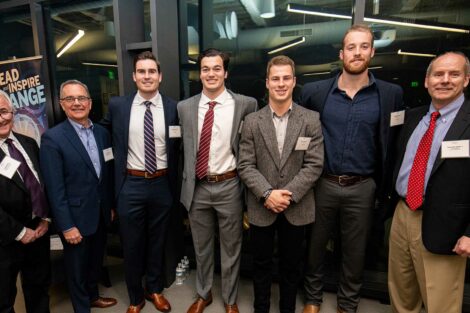

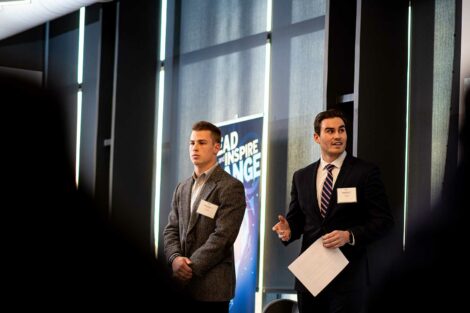
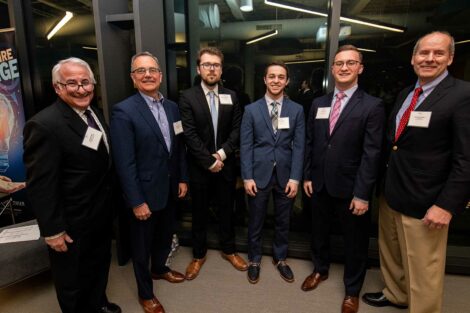
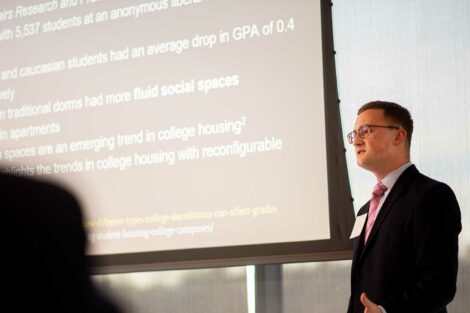
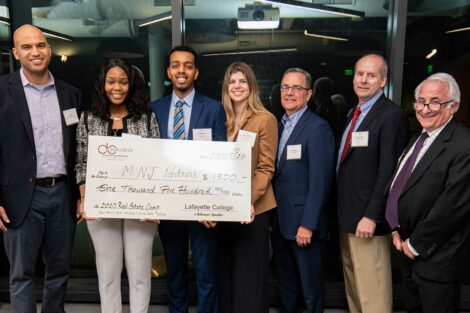








Teams faced some distinguished judges who are noted in their fields: John Pierce ’81 from the Rockefeller Group, Scott Van Cleef ’85 from Country Classics Inc., and Craig Becker, assistant vice president for finance at Lafayette.
With only 15 minutes to present their case, the first team was SJC Capital. Alek Seibel ’22, Dylan Jainchill ’21, and George Crittenden ’21 shared the spotlight as they laid out their “beds alone” approach.
Rather than balance retail and residential, SJC Capital shifted the retail square footage into more units and common areas. The students faced tough questions on the variance they’d need to move away from retail.
Next up was Football Real Estate Advisors: Ryan Barnett ’20, Reed Aichholz ’21, Quinn Revere ’21, and Keegan Shoemaker ’23. Coming from outside the tri-state area, these students took a branding approach that could help attract prospects, improve the college experience, and ease tensions with College Hill neighbors.
They went all-in on retail, outfitting the space with a food franchise, convenience store, and entertainment option. The judges hit back with questions on parking.
The final team, NMJ Partners, consisted of Joseph Seyoum ’20, Maria Bucklin ’20, and Nina Milligan ’20, who suggested the College rent the retail space for a wellness center.
They outlined the need for it, and their vision included counseling suites, a demonstration kitchen, classrooms, a pharmacy, and on-site imaging and physical therapy. It would be open to everyone.
Questions came back about being the ground lease holder as well as the renter.
The hard part now was judge deliberations. Which team had the sharper analysis, the stronger recommendations, a feasible plan, a better presentation, and the ability to handle tough questions?
All three teams fared well and faced the unexpected. The night before the presentation Dyer Center officials noticed an error in the case numbers. It prompted messages and meetings with the teams, who had to manage an unplanned change and demonstrate their dexterity in the face of adversity.
Judges soon were praising all teams for their work, but in the end, there can be only one winner.
NMJ Partners took the $1,500 first prize, SJC Capital the $1,000 second prize, and Football Real Estate Advisors the $500 third prize.
Dahl thanked the sponsors including Michael Levy P ’18, CEO at Crow Holdings, for donating the first place prize, and Dan Huffenus ’86 P’22, partner at Katten Muchin Rosenman, LLP, for donating the second place prize.
But prizes aside, all students walked away with key real estate basics: how to combine economics, finance, empathy, strategy, and influence in order to win a deal.